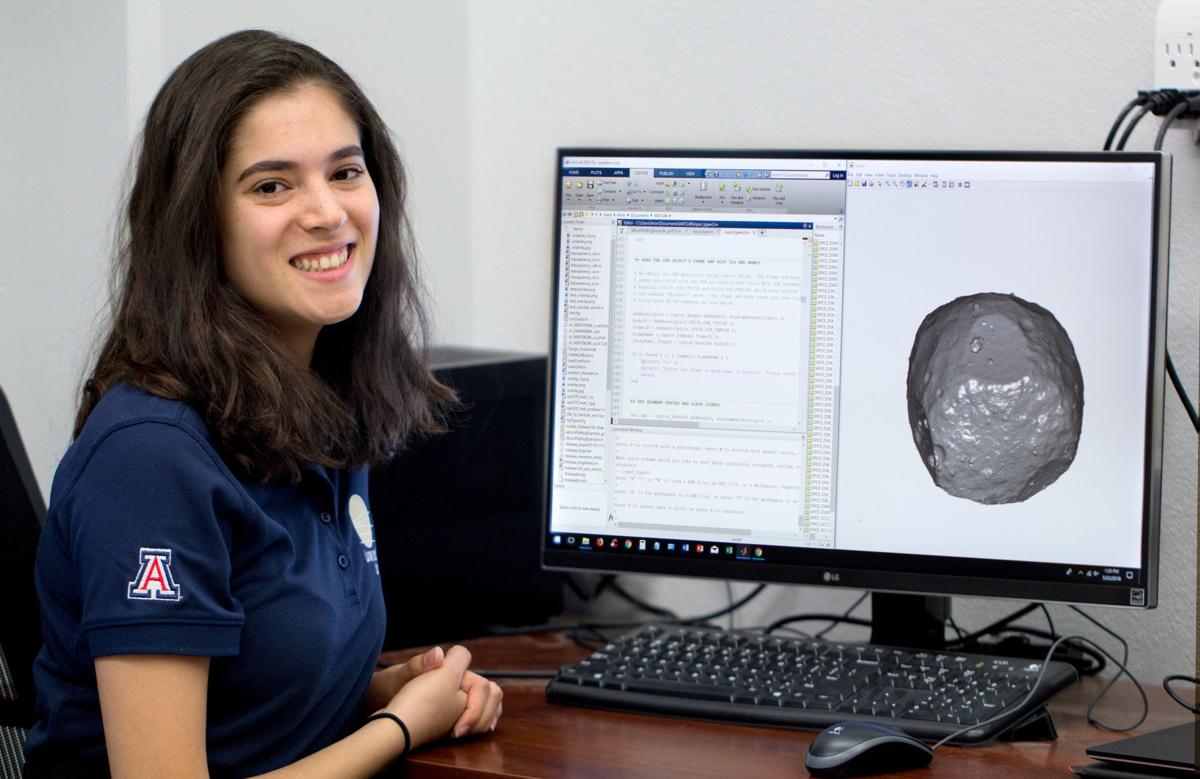UA student Adriana Mitchell sees her future in space — and is getting the chance now to do work on a mission to an asteroid.
“Ultimately I want to be an astronaut, especially doing research on the Martian frontier,” she said. And she knows how to play on her strengths to get here.
Mitchell is a University of Arizona Honors College undergraduate pursuing a bachelor’s degree in optical sciences.
Last week, she arrived in Japan where she is working with the Japan Aerospace Exploration Agency (JAXA) for one month on the Hayabusa2 sample-return mission to asteroid Ryugu. It is sister mission to the UA-led OSIRIS-REx.
As the spacecraft approaches the asteroid, she will collaborate with an international team of scientists to quickly convert the data captured by the optical navigation camera into a 3D map of Ryugu’s surface.
“It is a good experience for her, of course,” said Lucille Le Corre, a co-investigator on the mission and one of Mitchell’s mentors who is also in Japan. “It’s rare for a student to come during operations, and abroad is even more rare.”
Le Corre is also a research scientist at the Planetary Science Institute in Tucson.
At JAXA, Mitchell will have the full experience of the scientific process, Le Corre said. “She will have the opportunity to be involved in publication later on also.”
Dreams of being
an astronaut
Mitchell has had her professional trajectory sketched out for a long time.
With a dream of becoming an astronaut, she came to the UA for “the large space sciences program,” she said. She thought she’d pursue a degree in aerospace engineering but found her way to an optics open house.
“It was really inspiring,” she said. She switched her major when she realized there was such a strong connection between space sciences and optics. “I was like, ‘Heck yeah, this seems to be the coolest one out of engineering.’”
To keep herself on track, she focuses all her research and minor studies on planetary science.
As a sophomore, she took a class taught by the OSIRIS-REx principal-investigator Dante Lauretta. The class focuses on how he built the mission from an idea to what it is now. “Then he had us design a mock NASA mission,” she said. They planned to go to Europa, one of Jupiter’s moons, in search of life, she recalled. “It was so cool.”
She also spent some time doing research with Matt Penn of the National Solar Observatory.
She was introduced to Vishnu Reddy, assistant professor of planetary sciences, by a fellow student and mentor.
Reddy asked if she wanted to do work that would hone her strengths or tackle her weaknesses.
“She said she doesn’t like observing, she likes to code, and that’s what she wants to do,” Reddy said. She’s been chipping away at a couple projects with Reddy ever since.
By August, they will have completed a research paper together.
In a meeting between the two about six months ago, Mitchell told him that while her friends are doing study abroad in Europe, she wanted to go to Asia.
Reddy knew Le Corre was going to Japan and needed someone who could code data.
“We can solve two problems here,” Reddy said. He connected Le Corre with Mitchell.
“We have so many talented students and they’re just looking for opportunities,” he said. “Adriana was a little shy about working on the Japanese mission. I told her no, you’re at the point where you could be a role model yourself. You could inspire other undergraduates, so think of it as a public service.”
Mentors have been invaluable to Mitchell, she said, from answering big questions, like what graduate schools to apply to, to small questions, like what laptop to buy and what coding languages to learn.
“A lot of people will go out of their way to help you. You just have to ask,” she said.
To fund her research and travel, Mitchell applied for scholarships — something she does in her free time. “I guess this makes me a nerd. It just gives me a sense of accomplishment when I hit the submit button.”
She was the sole UA recipient of the Barry Goldwater Scholarship, which was established by Congress in 1986 and provides up to $7,500 per year in support.
She also received scholarships for travel through the Astronaut Scholarship Foundation and the Paul Anthony Bonenfant Memorial Scholarship.
Mitchell has also presented her past research at the 229th meeting of the American Astronomical Society, the Crossroads Eclipse 2017 Research Workshop, the 2017 Eclipse Science Showcase and the 12th American Physical Society’s Conference for Undergraduate Women in Physics.
But none of that gets to her head.
“Without Lucille and Vishnu, I definitely wouldn’t have gotten this opportunity,” she said, thanking JAXA as well.
“I want to encourage people to do what they want,” she said, “even if it sounds a bit ridiculous.”





